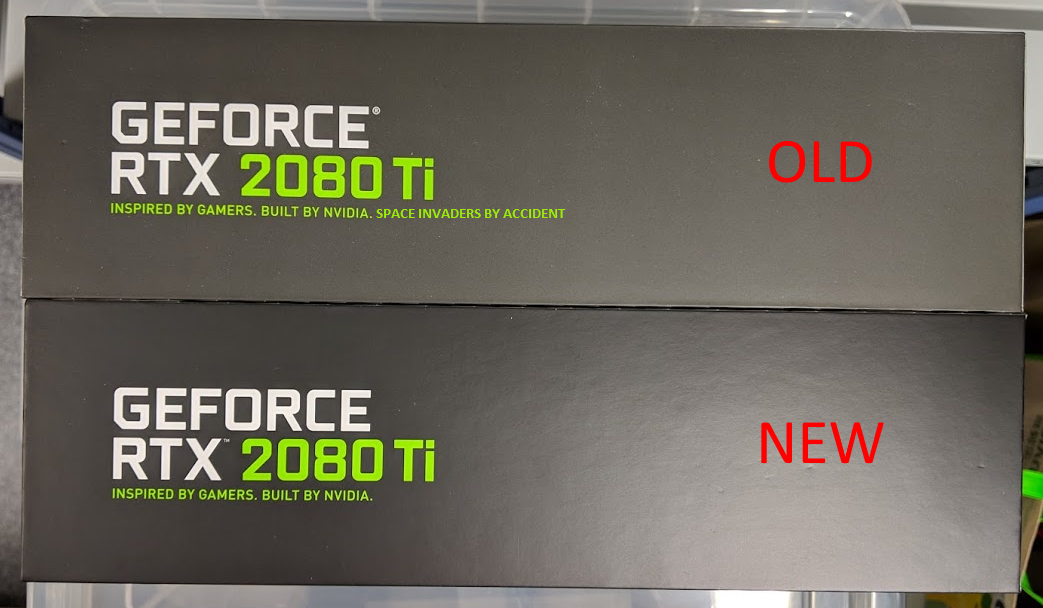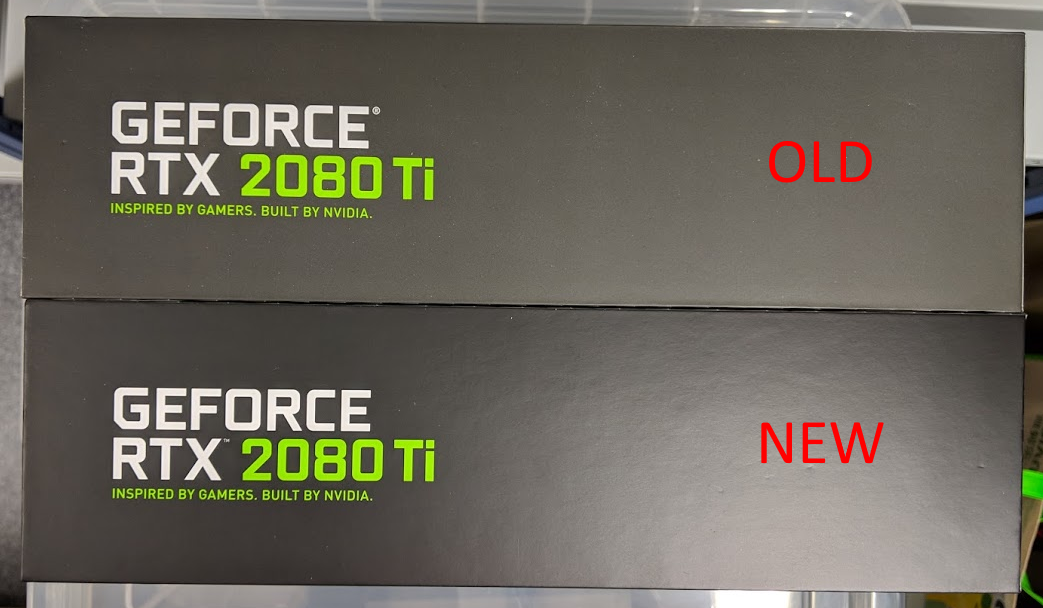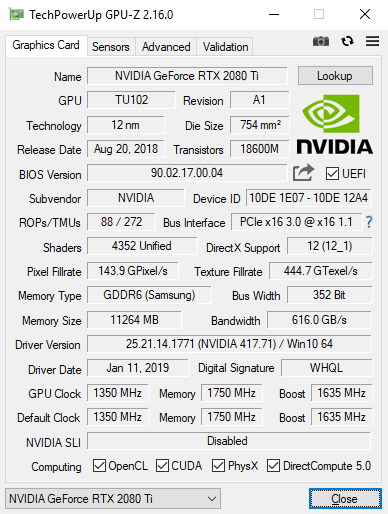Navigation
Install the app
How to install the app on iOS
Follow along with the video below to see how to install our site as a web app on your home screen.
Note: This feature may not be available in some browsers.
More options
You are using an out of date browser. It may not display this or other websites correctly.
You should upgrade or use an alternative browser.
You should upgrade or use an alternative browser.
RTX 2080 Ti FE Escapes Testing by Dying After 8 Hours @ [H]
- Thread starter FrgMstr
- Start date
-
- Tags
- 2080 ti fe failure gpu nvidia rtx test escape
GoodBoy
2[H]4U
- Joined
- Nov 29, 2004
- Messages
- 2,761
I wish we knew some solid data on failure rates. It seems higher, but it is the internet after all. However, multiple review sites having failures seems to suggest the rate is higher.
Someone was making fun that its only a 0.01% failure rate, and reviewers only got those cards.. Might not be far from the truth: it could be that the first batch of cards are the ones with sketchy components, and that the reviewers all got cards from the first batch (they obviously would, they card cards before anyone else). In that event we would see a lot of press about it (which we have).
The most convincing thing to me that this is a bigger than typical failure rate is that some people's replacement cards are also dying.
Looking forward to the article that explains what really happened, what the real failure rate has been.
Someone was making fun that its only a 0.01% failure rate, and reviewers only got those cards.. Might not be far from the truth: it could be that the first batch of cards are the ones with sketchy components, and that the reviewers all got cards from the first batch (they obviously would, they card cards before anyone else). In that event we would see a lot of press about it (which we have).
The most convincing thing to me that this is a bigger than typical failure rate is that some people's replacement cards are also dying.
Looking forward to the article that explains what really happened, what the real failure rate has been.
serial__thrilla
Limp Gawd
- Joined
- Jan 5, 2018
- Messages
- 171
Yeah, makes you wonder how they do their testing of the finalized product. Do they do it under perfect weather and air pressure conditions? Do they do it in a special freezer room? Who the fuck knows...I am so glad I did not buy one. Even after they fix the issue, I'm reluctant to support them, considering this issue should never have passed QC and secondly, the higher cost of the product should mean a better product.
Darunion
Supreme [H]ardness
- Joined
- Oct 6, 2010
- Messages
- 5,329
Yeah, makes you wonder how they do their testing of the finalized product. Do they do it under perfect weather and air pressure conditions? Do they do it in a special freezer room? Who the fuck knows...
I would bet they do in line gate testing. So they start the stress and age testing of the cards while production happens. Test fails then they decide whether to recall or just let it go and do replacements and damage control. Sometimes that plays out, sometimes it fails miserably. Usually this type of method is driven by management wanting product out sooner than the original internal timeline.
serial__thrilla
Limp Gawd
- Joined
- Jan 5, 2018
- Messages
- 171
That's horribly inefficient, isn't it? It's like sending a team of testers to the Arctic with a bunch of dehumidifiers to do the testing.I would bet they do in line gate testing. So they start the stress and age testing of the cards while production happens. Test fails then they decide whether to recall or just let it go and do replacements and damage control. Sometimes that plays out, sometimes it fails miserably. Usually this type of method is driven by management wanting product out sooner than the original internal timeline.
My real suspicion is that they just run of a bunch of electrical (like voltage/amperage) tests on some machine that was set up for it, and if the machine gives the "Test passed", they let the product out. As in, there is nothing like real life testing with benchmarks, games, stress testing by running shit in a loop, etc.
All for the sake of being fast and efficient in getting the product out.
But this is just my suspicion.
Darunion
Supreme [H]ardness
- Joined
- Oct 6, 2010
- Messages
- 5,329
That's horribly inefficient, isn't it? It's like sending a team of testers to the Arctic with a bunch of dehumidifiers to do the testing.
My real suspicion is that they just run of a bunch of electrical (like voltage/amperage) tests on some machine that was set up for it, and if the machine gives the "Test passed", they let the product out. As in, there is nothing like real life testing with benchmarks, games, stress testing by running shit in a loop, etc.
All for the sake of being fast and efficient in getting the product out.
But this is just my suspicion.
Agreed it is a terrible idea. Often costly and inefficent but it is faster just at a risk. A lot of companies use this method (usually when you are just doing a revision and not a full change) and it usually works.
Falkentyne
[H]ard|Gawd
- Joined
- Jul 19, 2000
- Messages
- 1,868
That's horribly inefficient, isn't it? It's like sending a team of testers to the Arctic with a bunch of dehumidifiers to do the testing.
My real suspicion is that they just run of a bunch of electrical (like voltage/amperage) tests on some machine that was set up for it, and if the machine gives the "Test passed", they let the product out. As in, there is nothing like real life testing with benchmarks, games, stress testing by running shit in a loop, etc.
All for the sake of being fast and efficient in getting the product out.
But this is just my suspicion.
THIS IS EXACTLY WHAT THEY DO.
What almost EVERY company does.
Go google the MSI China factory plant video to see how stuff is built and tested.
Granted, this was for *LAPTOPS*, but anyone who can think outside the box will get an idea of how things are done.
Night_Hawk-19
Gawd
- Joined
- Jun 20, 2004
- Messages
- 825
Why I am sticking to my 1080ti's. Sad state of affairs especially when they are almost 2000 grand in Canada. Epic fail. Anyways hardware is always ahead of software. Gonna wait a few generations.
Zarathustra[H]
Extremely [H]
- Joined
- Oct 29, 2000
- Messages
- 38,858
That's horribly inefficient, isn't it? It's like sending a team of testers to the Arctic with a bunch of dehumidifiers to do the testing.
My real suspicion is that they just run of a bunch of electrical (like voltage/amperage) tests on some machine that was set up for it, and if the machine gives the "Test passed", they let the product out. As in, there is nothing like real life testing with benchmarks, games, stress testing by running shit in a loop, etc.
All for the sake of being fast and efficient in getting the product out.
But this is just my suspicion.
THIS IS EXACTLY WHAT THEY DO.
What almost EVERY company does.
Go google the MSI China factory plant video to see how stuff is built and tested.
Granted, this was for *LAPTOPS*, but anyone who can think outside the box will get an idea of how things are done.
Of course this is how they do production testing. When you mass produce anyhing, you need a quick automated test, not something that uses lots of man hours.
For a consumer product like this you'll probably have some in process continuity and hipot testing followed by a quick final functional test.
That said, unless they are really lax in this industry there should also be some design testing where a representative sample up front goes through more rigorous testing before launch. I'd imagine there's at least some sort of electrical safety testing per whatever the applicable IEC standard is, as well as HALT (highly accelerated life testing) and some other functional validation here.
Last edited:
Well I just requested a "Refund" for my 2080 Ti. Card is working fine and all is good, but I can't have this hovering over the life of the card that any day could be the day it dies. Reason given to nvidia was "Quality issues with this product". An RMA was issued with return label and upon them receiving the product a refund will be issued with in 5-7 days.
Back to my trusty 1080 hybrid. And my son gets a new 1070 Ti for keeping my 1080 warm.
Green team dropped the ball on this one.
UPDATE:
1. Ordered 2080 Ti 10/17/2018 From NVIDIA Store
2. Recieved on 10/22/18
3. Graphics Card was working perfectly, all the horrors stories started to come out.
4. Reading this thread was the last straw and I requested a Refund on 11/22/18.
5. I Fed Ex the card back to NVIDIA on 11/26/18 (Fed Ex return labels provided by NVIDIA)
6. NVIDIA receives the returned card on 11/29/18.
7. I received my refund on 12/6/2018
Thank You Kyle for what you do.
And I have to give credit to NVIDIA for a top notch handling of my issue. Customer Service was quick and painless.
Starrbuck
2[H]4U
- Joined
- Jun 12, 2005
- Messages
- 2,981
UPDATE:
2. Recieved on 10/22/18
...
4. ... I requested a Refund on 11/22/18.
Wow! You barely made it in time!
Wow! You barely made it in time!
Had it not been for [H]ardocp 's issues I would of missed my 30 days. I was not even thinking about returning the card at the time. Literally read his replacement card went bad and I tapped out. It was just coincidence that it was my 30th day.
Special Thanks to Fed Ex for getting Kyle's faulty replacement card to replace original faulty card in time for me to tap out.
Brother Kyle, I'm just a gamer, but I'm assuming that this is tested by taking a good (new) card as a "Control" sample, and then testing for continuity among all the power stages and shunts and for proper voltage regulation and then comparing the readouts on the bad card, and looking for inconsistencies, to see if a part has failed. Then if an anomaly is found, then to find out what made the part fail. And if no issues with regulation or any parts is found anywhere, then it must have been the chip itself (if not memory) that failed?
This is just a guess. If I were the late great Leonard Nimoy....that would be my "Guess."
Fitting response to a "space invaders" issue.
Zarathustra[H]
Extremely [H]
- Joined
- Oct 29, 2000
- Messages
- 38,858
Who else frequently visits this thread and searches for "el chin" in order to find the latest updates? 
- Joined
- May 18, 1997
- Messages
- 55,624
Second card is with engineers now diagnosing issues.Who else frequently visits this thread and searches for "el chin" in order to find the latest updates?
Reading other articles on the net seems to indicate that this was primarily an early batch FE card issue. I had two new FE 2080Tis crash in my games before requesting a refund. But I am also seeing where non-FE cards are crashing too. So I have a hard time believing it is just an early batch of nvidia FE cards that are the problem.
kamikazi
[H]ard|Gawd
- Joined
- Jan 19, 2006
- Messages
- 1,607
Would love to see an update on this.
Looking forward to a follow up article/update on this issue.
I look at this as the longer the article takes to be published the more thorough it will be. I have never seen [H] or Kyle ever go half assed on tech issues/stories that he writes about.
So we must be patient and wait a little longer for the good stuff.
I look at this as the longer the article takes to be published the more thorough it will be. I have never seen [H] or Kyle ever go half assed on tech issues/stories that he writes about.
So we must be patient and wait a little longer for the good stuff.
- Joined
- May 18, 1997
- Messages
- 55,624
If you have a Space Invaders FE card that you have not sent in for RMA, please email me about it. I am looking to purchase one.
- Joined
- May 18, 1997
- Messages
- 55,624
No. I need a Space Invaders card.So how did it end? Do you have enough data for an article?
So after two DOA (crashing) 2080Ti FE cards, I finally got my refund back from the nVidia store (took over a month after they received the 2nd card). Last week I decided to try an EVGA 2080Ti card as the third and final attempt (11G-P4-2387-KR). I gamed on it all weekend, getting 30+ hours on it and so far not a single hiccup, lockup, or crash. I realize some here didn't have issues till weeks or months after installing their cards but so far this card is at least running my games and not crashing. Will update if this one starts giving me issues.
My 2080 Ti FE also died 2 months after purchase and very little use (my calculation is less than 2 weeks of effective usage), production is week 34 of 2018, micron memory. Opened the RMA and provided photo of serial number, got an advanced RMA card shipped the next day, should arrive today. Hopefully this one lasts longer....
TheOne&OnlyZeke
100% Irish
- Joined
- Jul 21, 2000
- Messages
- 11,248
I am so glad I can't afford one of these cards. Failure rate seems incredible.
I'll be able to afford one when the next gen comes out and then it'll be stable
I'll be able to afford one when the next gen comes out and then it'll be stable
notarat
2[H]4U
- Joined
- Mar 28, 2010
- Messages
- 2,501
Just got my new card, not sure which memory as I can only install it in a few hours, definitely darker box as it has been seen before.
View attachment 138414
ftfy

Starrbuck
2[H]4U
- Joined
- Jun 12, 2005
- Messages
- 2,981
Interesting that on the old box GEFORCE is registered and there is no trademark on the RTX, and on the new box GEFORCE is not registered and RTX is trademarked.
Nobu
[H]F Junkie
- Joined
- Jun 7, 2007
- Messages
- 10,050
Probably just a print error/typo, but a bit humorous, yeah.Interesting that on the old box GEFORCE is registered and there is no trademark on the RTX, and on the new box GEFORCE is not registered and RTX is trademarked.
I even didn't notice that, lolInteresting that on the old box GEFORCE is registered and there is no trademark on the RTX, and on the new box GEFORCE is not registered and RTX is trademarked.
Thanks for pointing it out!
LOLz, I actually had the black screen issue, could not get a signal as soon as installed the drivers, but I did see space invaders under full load couple of times before that.
![[H]ard|Forum](/styles/hardforum/xenforo/logo_dark.png)

